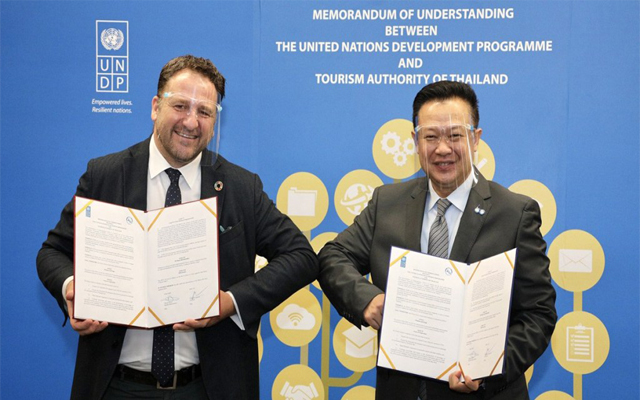
The Tourism Authority of Thailand (TAT) has teamed up with the United Nations Development Programme (UNDP) to formulate a long-term sustainable tourism strategy for the Thai tourism industry.
A Memorandum of Understanding (MoU) between TAT and the UNDP was signed on June 5, by UNDP resident representative in Thailand, Renaud Meyer, and TAT governor, Yuthasak Supasorn.

The MoU provides a platform for collaboration to integrate sustainability as a fundamental principle for tourism in Thailand and share Thailand’s experience in sustainable tourism with other countries, building on UNDP’s presence in 170 countries and territories around the world. It is in line with TAT’s over-arching objective to strengthen confidence in the Thai tourism industry with a series of Restore and Reform measures.
Yuthasak said in a press statement: “TAT has always realised the importance of promoting sustainable tourism. Collaborating with the UNDP to align this objective with the SDGs (Sustainable Development Goals) will go a long way towards enhancing the overall quality of the tourism products and services nationwide. It will allow us to broaden our knowledge base and incorporate experiences in sustainable tourism from different angles at the national and international levels.”
He noted that it was especially significant to be advancing this agenda in the year marking the 60th anniversary of TAT, a day that has also been designated as the start of the Decade of Action, set to accelerate progress towards the SDGs by all UN member states.
“Thailand is known all over the world for its superb tourism products and services, and the friendliness and hospitality of its people. In future, however, we will have to better balance quantity versus quality, and marketing versus management,” added Yuthasak.
Meyer said the pandemic had reminded the world of the “vulnerability” of the tourism sector and “the need to define a new normal for tourism that has to be based on sustainability, inclusion and ensuring more benefits for the local communities”.
Collaboration between the two will involve updating the King’s Wisdom to Sustainable Tourism project to include a socio-economic impact assessment and recovery plan for the tourism sector from Covid-19 as well as work to promote biodiversity-based tourism.
TAT is undertaking a range of social and environmental initiatives in different industry and economic sectors as part of the strategy to promote responsible tourism. It is also focusing on the promotion of 55 emerging destinations to decongest well-known tourist spots, create jobs in the rural areas and reduce income disparities.



















